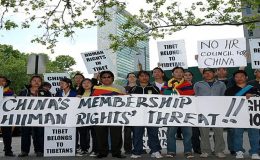Tuesday 11 August
The Economist has quietly dropped propaganda advertorials paid for by the Chinese government after a successful campaign by Free Tibet and International Tibet Network.
For approximately two years, the Economist had been running advertorials called “China Focus”, written by Beijing Review, a state propaganda outlet under the direct control of the ruling Chinese Communist Party (CCP). The pieces were marked as advertising content but closely resembled articles. They hailed China’s rapid development, its success in combating COVID-19 and promoted China’s controversial international trade plans, known as the Belt and Road Initiative (1).
This content has been absent from recent editions of the Economist, prompting Tibet campaigners and investigative journalists to believe that the Economist and Beijing Review have parted ways.
An investigation by journalist Dean Sterling Jones, who has been closely following this story, has revealed that the Economist’s subdomain, chinafocus.economist.com, has quietly disappeared, having expired on 26 July 2020 (2).
This is a significant victory against one of the Chinese Communist Party’s oldest and most established propaganda arms. Beijing Review was established in 1958 by the government-controlled China International Publishing Group, with the purpose of communicating China’s policies to the rest of the world. In recent years it has published pieces hailing “democratic reform” in Tibet (3), a country which was invaded in 1950 and has been under a harsh occupation ever since, with little in the way of civil rights and political freedoms (4). Beijing Review also describes the Uyghur region (referred to as “Xinjiang” by China) as “blossoming” and “bask[ing] in the glow of an industrial diversification campaign” (5). Beijing’s treatment of the Uyghur people has received growing media attention after details were revealed of over a million Uyghurs and other Turkic peoples being forced into giant internment camps (6). The Beijing Review refers to these camps as “training centres” that “offer hope” (7).
John Jones, Campaigns and Communications Manager at Free Tibet, said:
“Chinese state media outlets like Beijing Review and China Daily have been spewing CCP propaganda for decades. As China robs Tibetans and Uyghurs of their land and their rights and muzzles their attempts to communicate with the wider world, these propaganda rags fill up the space, perpetuating lies that the invasion of Tibet has brought about democracy or that the internment of Uyghurs in concentration camps is a way of helping them. International media outlets should not be enabling these state propaganda outlets, they should be exposing them.
“Fortunately the tide is turning. Our campaigning is getting results. The Telegraph has scrapped its CCP propaganda, the Economist has scrapped its CCP propaganda, now, as we celebrate a massive victory for Tibet, we turn our attention to other newspapers like the Wall Street Journal. To them, we say: stand with the victims, tell the truth, scrap the propaganda”.
Tenzin Jigdal from International Tibet Network said:
“This decision by the Economist is a long-awaited victory for Tibetans, Uyghurs, Hong Kongers and concerned global citizens who have for years expressed their opposition to the presence of China’s propaganda on our newspaper stands. The international backlash we are witnessing shows that people will not sit idly by as reputable media outlets such as the Economist think they can trade their values in exchange for cash from the Chinese government, without anyone noticing. Media outlets should expose injustices and human rights violations when they occur, not act as a mouthpiece for a repressive regime. We hope that this is just the start, and other newspapers – such as the Wall Street Journal, Sydney Morning Herald and Handelsblatt – will now follow suit and scrap their dirty deals with Chinese state media once and for all.”
The Economist is one of several international newspapers to have made deals with Chinese state media outlets to run paid propaganda pieces. At least 25 newspapers have been found to be running content from China Daily, another CCP-controlled news source. This includes the US business newspaper The Wall Street Journal, the Sydney Morning Herald, Le Figaro in France, El Pais in Spain and the Japanese newspaper Mainichi Shimbun (8). The deals are secretive, but documents acquired by journalists have revealed that they are worth hundreds of thousands of pounds, in some cases millions (9).
Several newspapers have ended their relationship with the Chinese state media outlets following intense scrutiny. The New York Times and Washington Post both ran content from China Daily until late last year. In the UK, the Telegraph ended its relationship with China Daily in March 2020 (10). Free Tibet had repeatedly contacted the Telegraph, urging them to end its deal with China Daily after years of the Telegraph running supplements hailing environmental development in Tibet and celebrating the CCP’s democratisation of Tibet (11).
Following the Telegraph’s decision, Free Tibet launched a campaign in April, targeting the Economist and Wall Street Journal. It was soon joined by International Tibet Network, an organisation representing over 160 Tibet groups around the world, which expanded the campaign to also target the Sydney Morning Herald and German newspaper Handesblatt. Close to 5,000 people have signed actions from Free Tibet (12) and International Tibet Network (13), calling on these newspapers to scrap the propaganda efforts.
The Economist has not responded to any communications, making it difficult to confirm if and when a decision was taken to part ways with Beijing Review. In July, both organisations, along with Students for a Free Tibet, organised a projection onto the Economist headquarters, demanding to know whether the newspaper had dropped its deal (14).
CONTACT: For further information:
John Jones, Free Tibet, UK | +44 (0)777 068 1938 | john@freetibet.org
Gloria Montgomery, International Tibet Network | +44 (0)7541 36 2001 | gloria@tibetnetwork.org
Tenzin Jigdal, International Tibet Network | +91 (0)9805274608 | jigdal@tibetnetwork.org
Notes for editors.
- http://www.bjreview.com/China_Focus/The_Economist/
- https://shootingthemessenger.blog/2020/08/10/the-economist-disappears-advertisement-feature-paid-for-by-chinese-communist-party/
- http://www.bjreview.com/Nation/201903/t20190329_800163666.html
- https://www.freetibet.org/news-media/na/report-tibet-ranked-second-least-free-place-world ; https://freedomhouse.org/country/tibet/freedom-world/2020
- http://www.bjreview.com/Xinjiang_Blossoming/node_26381.html
- https://www.washingtonpost.com/opinions/global-opinions/a-spreadsheet-of-those-in-hell-how-china-corralled-uighurs-into-concentration-camps/2020/02/28/4daeca4a-58c8-11ea-ab68-101ecfec2532_story.html
- http://www.bjreview.com/Nation/202003/t20200307_800195948.html
- https://www.theguardian.com/news/2018/dec/07/china-plan-for-global-media-dominance-propaganda-xi-jinping
- https://www.voanews.com/east-asia-pacific/voa-news-china/us-spending-report-sheds-light-chinas-global-propaganda-campaign
- https://freetibet.org/news-media/na/daily-telegraph-stops-publishing-paid-chinese-propaganda
- https://www.telegraph.co.uk/sponsored/china-watch/society/11897843/china-celebrates-50-years-tibet-autonomy.html
- https://secure.freetibet.org/remove-ccp-propaganda-economist
- https://cancelchinapropaganda.org/
- https://www.youtube.com/watch?v=ncknRA0sZng&feature=emb_logo





